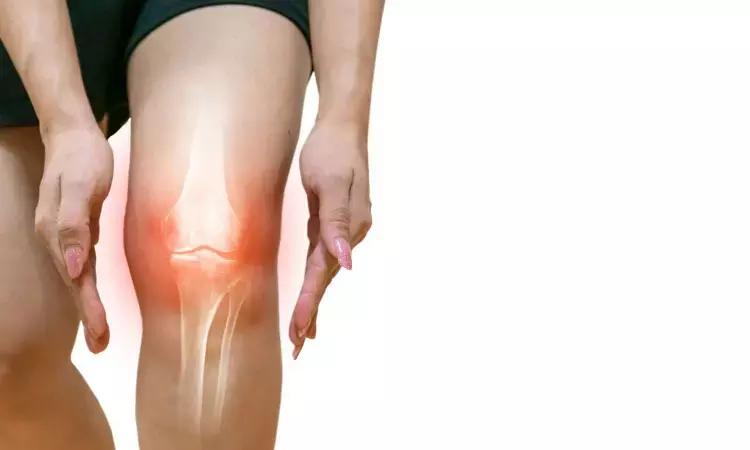- Home
- Medical news & Guidelines
- Anesthesiology
- Cardiology and CTVS
- Critical Care
- Dentistry
- Dermatology
- Diabetes and Endocrinology
- ENT
- Gastroenterology
- Medicine
- Nephrology
- Neurology
- Obstretics-Gynaecology
- Oncology
- Ophthalmology
- Orthopaedics
- Pediatrics-Neonatology
- Psychiatry
- Pulmonology
- Radiology
- Surgery
- Urology
- Laboratory Medicine
- Diet
- Nursing
- Paramedical
- Physiotherapy
- Health news
- Fact Check
- Bone Health Fact Check
- Brain Health Fact Check
- Cancer Related Fact Check
- Child Care Fact Check
- Dental and oral health fact check
- Diabetes and metabolic health fact check
- Diet and Nutrition Fact Check
- Eye and ENT Care Fact Check
- Fitness fact check
- Gut health fact check
- Heart health fact check
- Kidney health fact check
- Medical education fact check
- Men's health fact check
- Respiratory fact check
- Skin and hair care fact check
- Vaccine and Immunization fact check
- Women's health fact check
- AYUSH
- State News
- Andaman and Nicobar Islands
- Andhra Pradesh
- Arunachal Pradesh
- Assam
- Bihar
- Chandigarh
- Chattisgarh
- Dadra and Nagar Haveli
- Daman and Diu
- Delhi
- Goa
- Gujarat
- Haryana
- Himachal Pradesh
- Jammu & Kashmir
- Jharkhand
- Karnataka
- Kerala
- Ladakh
- Lakshadweep
- Madhya Pradesh
- Maharashtra
- Manipur
- Meghalaya
- Mizoram
- Nagaland
- Odisha
- Puducherry
- Punjab
- Rajasthan
- Sikkim
- Tamil Nadu
- Telangana
- Tripura
- Uttar Pradesh
- Uttrakhand
- West Bengal
- Medical Education
- Industry
Long-Term Success of Lifestyle Intervention in Osteoarthritis: Study Shows Promising Two-Year Follow-Up

Netherlands: In a breakthrough study aimed at combating osteoarthritis (OA), researchers have reported promising results from a lifestyle intervention program named "Plants for Joints." The findings, published in a recent issue of Annals of the Rheumatic Diseases, reveal the sustained effectiveness of this intervention even two years after its initiation.
The study revealed significant improvements in stiffness, physical function, and pain observed after the Plants for Joints (PFJ) intervention maintained for up to two years, indicating the effectiveness of lifestyle modifications in the long term. The PFJ multidisciplinary lifestyle Intervention is based on a whole-food plant-based diet, physical activity, and stress management.
"Two years following completion of a 4-month program to improve exercise and eating habits in a randomized controlled trial, the benefits in function and pain for patients with osteoarthritis were maintained for a full two years afterward without any sign of rebound," the researchers reported. The findings were presented at the European Alliance of Associations for Rheumatology (EULAR) annual meeting.
The 16-week PFJ multidisciplinary lifestyle Intervention reduced The Western Ontario and McMaster Universities Osteoarthritis Index (WOMAC) score compared to usual care in people with hip/knee OA and metabolic syndrome in a randomized control trial (RCT) setting. Carlijn Wagenaar, Reade, Rheumatology, Amsterdam, Netherlands, and colleagues aimed to determine the long-term effectiveness of the PFJ intervention on stiffness, pain, and daily functioning in OA patients two years after the PFJ intervention.
The study included patients with hip/knee osteoarthritis. They were randomized to receive the PFJ intervention in addition to usual care, or the control group, which received usual care. Following the 16-week RCT period, the control group also received the intervention. After completion of the intervention participants were followed up for two years with biannual visits and six adherence-promoting webinars per year.
Changes in medication intensity between trial initiation and the extensive study's end were classified as “increase”, “stable”, or “decrease”. Secondary outcomes included metabolic and anthropometric markers. One active treatment cohort was formed combining the data of all patients from the start of PFJ. Changes over time were analyzed through an intention-to-treat analysis with a linear mixed model.
The researchers reported the following findings:
- 43 of the 64 trial completers also completed the two-year follow-up.
- Participants who discontinued the extension study measurements most often indicated they were unreachable or too busy. 84% of participants were female, with a mean age of 63 and a baseline body mass index of 33 kg/m2.
- Two years after completing the PFJ intervention, the improvement in WOMAC-total score after PFJ was maintained and significantly lower compared to baseline: –9.1. Furthermore, all components of the WOMAC improved significantly compared to the baseline.
- Results were similar in participants completing the two-year extension study vs. those that discontinued prematurely: mean WOMAC-total change during intervention completer: –11.7, dropout: –10.9; mean change up to first-year extension study completer: –8.5, dropout: –4.3.
- Of the 19 participants who completed the extension study and used pain medication, 53% decreased or stopped, while 47% had increased pain medication.
- After the two-year follow-up period weight, fasting blood glucose, waist circumference, and diastolic blood pressure remained significantly lower than baseline values, there was no longer a significant difference in HbA1c and LDL cholesterol.
- Of those who completed the follow-up and used lipid-lowering medication, 44% decreased, 38% remained stable, and 19% increased their lipid-lowering medications.
The study limitations included its necessary unblinded nature and the substantial dropout rate during the extension. The investigators promised a cost-effectiveness evaluation at some point but Wagenaar did not report the costs associated with the program in her EULAR talk.
Reference:
Wagenaar C, Walrabenstein W, Van der Leeden M, et alOP0217 LONG-TERM EFFECTIVENESS OF A LIFESTYLE INTERVENTION FOR OSTEOARTHRITIS: TWO-YEAR FOLLOW-UP AFTER THE “PLANTS FOR JOINTS” RANDOMIZED CLINICAL TRIALAnnals of the Rheumatic Diseases 2024;83:118-119.
Dr Kamal Kant Kohli-MBBS, DTCD- a chest specialist with more than 30 years of practice and a flair for writing clinical articles, Dr Kamal Kant Kohli joined Medical Dialogues as a Chief Editor of Medical News. Besides writing articles, as an editor, he proofreads and verifies all the medical content published on Medical Dialogues including those coming from journals, studies,medical conferences,guidelines etc. Email: drkohli@medicaldialogues.in. Contact no. 011-43720751


